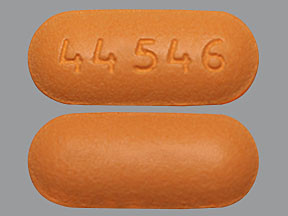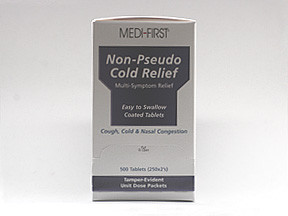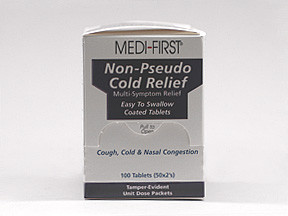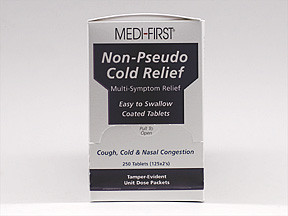DECONGESTANT/DEXTROMETHORPHAN/ACETAMINOPHEN/GUAIFENESIN - ORAL
PHONETIC PRONUNCIATION:
GENERIC NAME(S): phenylephrine HCl/dextromethorphan HBr/acetaminophen/guaifen
Uses
USES: This combination medication is used to temporarily treat cough, chest congestion, fever, body aches, and stuffy nose symptoms caused by the common cold, flu, or other breathing illnesses (e.g., sinusitis, bronchitis). Guaifenesin is an expectorant that helps to thin and loosen mucus in the lungs, making it easier to cough up the mucus. Dextromethorphan is a cough suppressant that affects a certain part of the brain (cough center), reducing the urge to cough. Decongestants help to relieve stuffy nose symptoms. This product also contains acetaminophen (APAP), a non-aspirin pain reliever and fever reducer. This medication is not usually used for ongoing coughs from smoking, asthma, other long-term breathing problems (e.g., emphysema), or coughs with a lot of mucus unless directed by your doctor. Cough-and-cold products have not been shown to be safe or effective in children younger than 6 years. Therefore, do not use this product to treat cold symptoms in children younger than 6 years unless specifically directed by the doctor. Some products (such as long-acting tablets/capsules) are not recommended for use in children younger than 12 years. Ask your doctor or pharmacist for more details about using your product safely. These products do not cure or shorten the length of the common cold and may cause serious side effects. To decrease the risk for serious side effects, carefully follow all dosage directions. Do not use this product to make a child sleepy. Do not give other cough-and-cold medication that might contain the same or similar ingredients (see also Drug Interactions section). Ask the doctor or pharmacist about other ways to relieve cough and cold symptoms (such as drinking enough fluids, using a humidifier or saline nose drops/spray).
How to use DECONGESTANT/DEXTROMETHORPHAN/ACETAMINOPHEN/GUAIFENESIN - ORAL
HOW TO USE: See also Warning section. If you are using the over-the-counter product, read and follow all directions on the product package before taking this medication. Take this medication by mouth with or without food, usually every 4 to 6 hours as needed, or as directed by your doctor. Drink plenty of fluids when you use this medication unless otherwise directed by your doctor. The fluid will help loosen the mucus in your lungs. If you are using a liquid form, carefully measure your dose using a medication-measuring device or spoon. Do not use a household spoon because you may not get the correct dose. For some liquid products, you may need to shake the bottle well before each dose. Check the directions on the product package. The dosage is based on your age, medical condition, and response to treatment. Do not increase your dose or take this medication more often than directed without your doctor's approval. Improper use of this medication (abuse) may result in serious harm (e.g., brain damage, seizure, death). Tell your doctor if your condition persists for more than 5 to 7 days, if it worsens, or if it occurs with rash, persistent headache, or fever lasting more than 3 days. These may be symptoms of a serious medical problem and should be checked by a doctor.
Side Effects
Precautions
Interactions
Overdose
Images

- color
- orange-peach
- shape
- oblong
- imprint
- 44 546
Reviews
Faq for DECONGESTANT/DEXTROMETHORPHAN/ACETAMINOPHEN/GUAIFENESIN - ORAL
This medication is a combination of decongestant, dextromethorphan, acetaminophen, and guaifenesin, and it is used to relieve symptoms of the common cold, flu, allergies, and sinusitis. It helps to relieve nasal congestion, cough, headache, fever, and mucus buildup.
The decongestant in this medication constricts blood vessels in the nasal passages, reducing nasal congestion. Dextromethorphan is a cough suppressant that helps to suppress a dry, non-productive cough. Acetaminophen is a fever and pain reducer, while guaifenesin helps in loosening and thinning mucus in the airways.
This medication is generally not recommended for children under the age of 12. Before giving it to a child, it is important to consult with a healthcare professional for appropriate dosing instructions.
The decongestant in this medication can elevate blood pressure and may not be suitable for individuals with high blood pressure or heart disease. It is advisable to consult with a healthcare professional before taking this medication if you have these conditions.
It is essential to talk to a healthcare professional or pharmacist about all the medications you are taking before starting this medication, as some drugs may interact negatively with decongestants, acetaminophen, or dextromethorphan.
Common side effects may include dizziness, drowsiness, nausea, upset stomach, or mild allergic reactions such as rash or itching. If these side effects persist or worsen, it is important to seek medical attention.
Follow the instructions provided by your healthcare professional or the medication label carefully. Take the recommended dosage with a full glass of water, and do not exceed the recommended dose or take it more frequently than directed.
This medication may cause drowsiness or dizziness, so it is advisable to avoid driving or operating machinery until you know how it affects you. If you experience severe drowsiness or dizziness, it is important to seek medical advice.
If you miss a dose, take it as soon as you remember. However, if it is close to the time for your next dose, skip the missed dose and resume your regular dosing schedule. Do not double the dose to catch up.
Warning
WARNING: One ingredient in this product is acetaminophen. Taking too much acetaminophen may cause serious (possibly fatal) liver disease. Adults should not take more than 4000 milligrams (4 grams) of acetaminophen a day. People with liver problems and children should take less acetaminophen. Ask your doctor or pharmacist how much acetaminophen is safe to take. Do not use with any other drug containing acetaminophen without asking your doctor or pharmacist first. Acetaminophen is in many nonprescription and prescription medications (such as pain/fever drugs or cough-and-cold products). Check the labels on all your medicines to see if they contain acetaminophen, and ask your pharmacist if you are unsure. Get medical help right away if you take too much acetaminophen (overdose), even if you feel well. Overdose symptoms may include nausea, vomiting, loss of appetite, sweating, stomach/abdominal pain, extreme tiredness, yellowing eyes/skin, and dark urine. Daily alcohol use, especially when combined with acetaminophen, may damage your liver. Avoid alcohol.
Disclaimer
IMPORTANT: HOW TO USE THIS INFORMATION: This is a summary and does NOT have all possible information about this product. This information does not assure that this product is safe, effective, or appropriate for you. This information is not individual medical advice and does not substitute for the advice of your health care professional. Always ask your health care professional for complete information about this product and your specific health needs.




No Reviews Yet